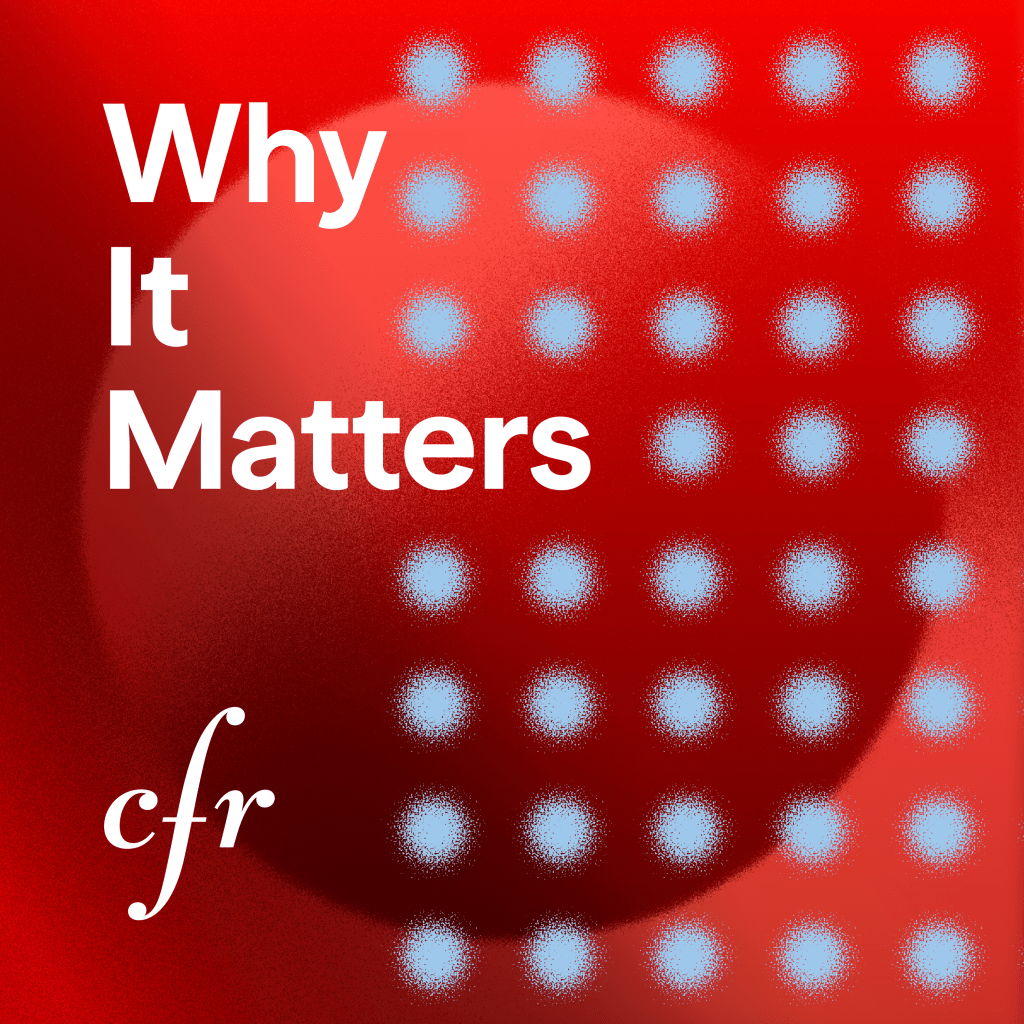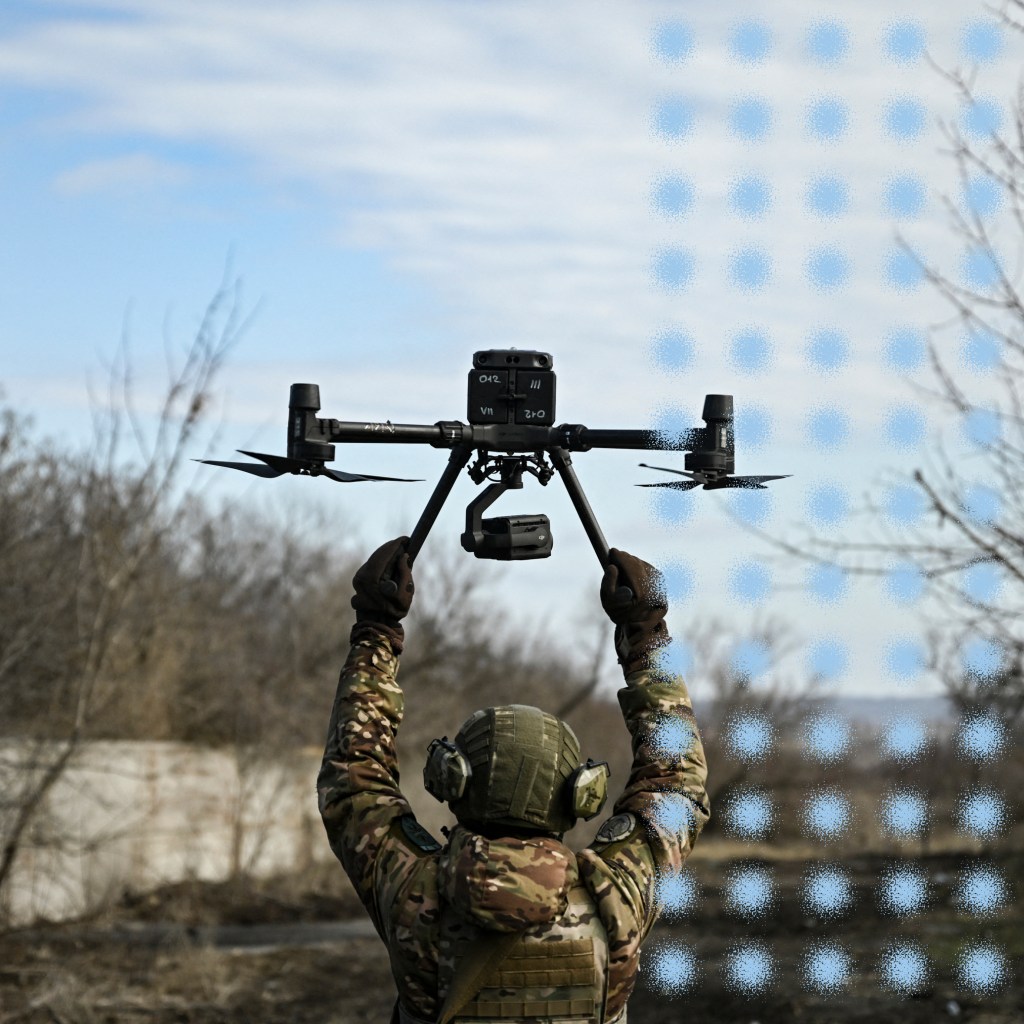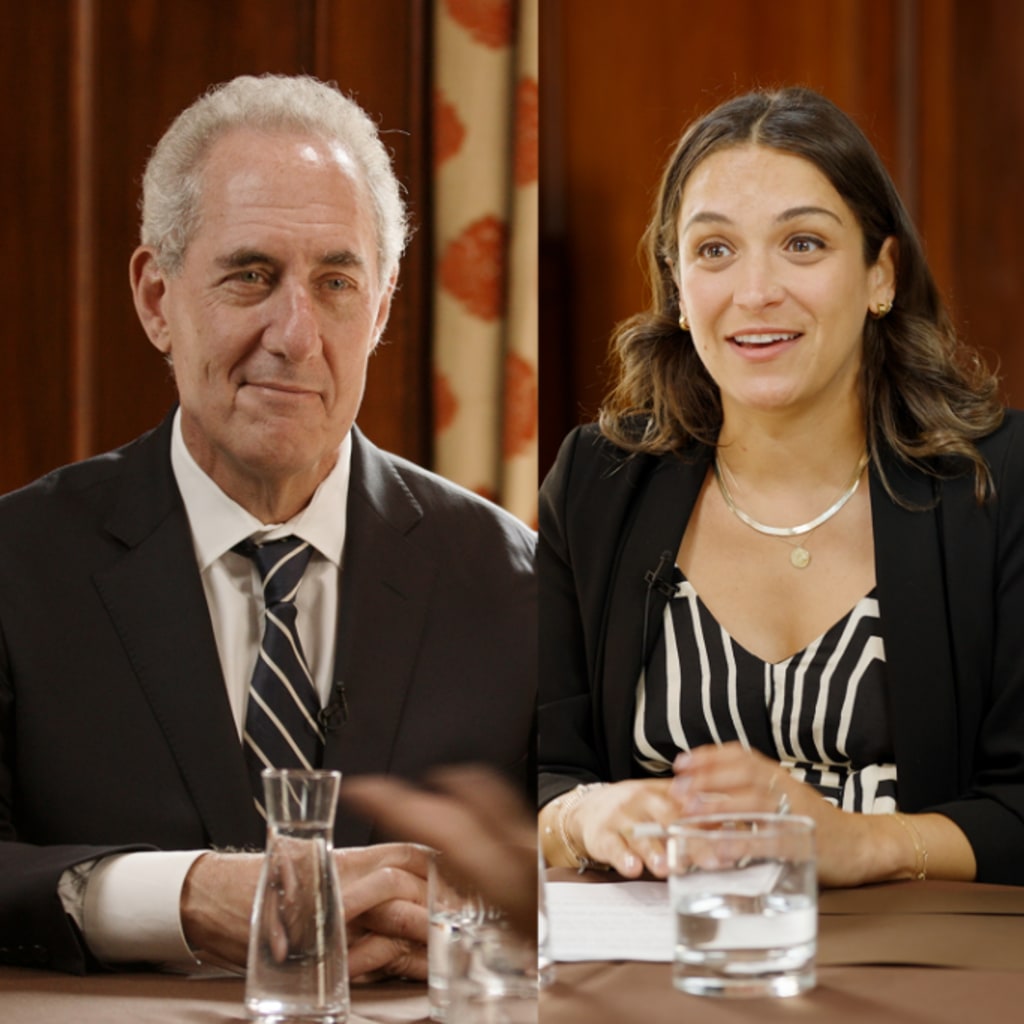Tariff Turmoil, Part 2: Steel and Dog Gelato
Tariffs have sparked intense debate in Washington, but their consequences land far from Capitol Hill. Tariffs can shape paychecks, shift prices for consumers, and affect markets. At best, tariffs offer short-term protection for certain industries. At worst, they can uproot the lives of American workers. In this episode, Why It Matters looks at what tariffs mean for a U.S. steel manufacturer and small business owner trying to stay afloat.
Published
Host
- Gabrielle SierraDirector, Podcasting
Guests
- Matthew P. Goodman
- Jamie SychakPresident of United Auto Workers Local 3303
- Debbie HendrickxFounder and CEO of Swell Gelato
Producer
- Molly McAnanyProducer, Podcasts
Audio Producer and Sound Designer
- Markus ZakariaAudio Producer & Sound Designer
Show Notes
Regardless of the intention behind them, tariffs carry consequences that reach far beyond the negotiating table. For U.S. steel manufacturers, tariffs could be a lifeline in a highly competitive global market. But for small business owners whose supply chain costs could skyrocket because of import taxes, tariffs can make or break their business.
This season, Why It Matters is taking you through the ins and outs of trade. In part two of our episode on tariffs, Why It Matters unpacks the trade-offs of tariffs, how tariffs could protect and preserve the U.S. steel industry, and how a small business faces uncertainty in new markets.
From CFR
Benn Steil and Elisabeth Harding, “Steel Productivity Has Plummeted Since Trump’s 2018 Tariffs”
Dr. Christopher W. Smart, “Tariff Strategies Don’t Cause Inflation, But Trade Wars Do”
Jonathan E. Hillman, “Chips, Steel, and Lawnmowers: What Trade Is Strategic?”
Shannon K. O’Neil and Julia Huesa, “What Trump’s Aluminum and Steel Tariffs Will Mean, in Six Charts”
From Our Guest
Matthew P. Goodman and Allison J. Smith, “American Views on Economic Leadership,” CFR.org
Matthew P. Goodman and Allison J. Smith, “How Countries Stack Up on Trump’s Reciprocal Tariffs,” CFR.org
Read More
Timothy Aeppel, “Tariffs May Mean More U.S. Steel Jobs. Will There Be Workers to Fill Them?,” Reuters
Megan Cerullo, “Small Business Owners Push for Exemptions From Trump’s Tariffs,” CBS News
Transcript
What do you envision when you think of American-made goods? Maybe you think of Ford motors, Harley-Davidson motorcycles, or the automobile industry of the midwest. Or the heavy machinery and factories of the industrial revolution that produce the products we need to keep American manufacturing and farms running. Or the ships and aircraft carriers used by the United States military.
Everything I just mentioned is made with steel. The U.S. is the fourth largest producer of steel in the world, and much of what is made here is also used here.
There is a deep sense of patriotism and pride in knowing these goods are made in the USA. But when other countries offer cheaper alternatives, it can threaten not just our economy but our national security.
There is bipartisan support that the U.S. steel industry needs to be protected, and that the U.S. risks becoming overly dependent on foreign imports if it allows domestic production to decline or vanish altogether. And that’s where tariffs come in.
I’m Gabrielle Sierra and this is Why It Matters. Today, we’re sitting down with a small business owner whose business could be disrupted by tariffs. But first, we’re going to hear from a U.S. steelworker about how tariffs are impacting his livelihood.
Jamie SYCHAK: I’m Jamie Sychak. I am currently president of UAW Local for a steel mill in Butler, Pennsylvania.
Gabrielle SIERRA: First of all, Jamie, thank you for speaking with us.
SYCHAK: Oh, absolutely. Just glad to be able to share some of this.
Steel has been and continues to be a major talking point for the Trump administration, and a key good being protected by Trump’s tariffs.
In his first term, President Trump imposed steel and aluminum tariffs on several trading partners, and now in this administration, he’s imposed another 25 percent set of tariffs. And while this move will raise the cost of imported steel, which makes up about a quarter of the U.S.’s domestic need, these tariffs will help provide some protection for domestic steel production. This is where Jamie comes in, and you won’t be surprised to hear him make a case for protecting domestic producers.
SYCHAK: First, I’ll disclose, I’m not an economist, I’m a union president for a grain-oriented electrical steel mill. But in fairness, you’re going to pay a tariff if you buy a tariffed product or tariffed commodity. If there’s an alternative to buy domestically, there’s no tariff on that. So I think that’s one of the things that you have to recognize. If you’re going to bash the fact that something’s tariffed, is there an alternative? Can you buy domestically? And secondly, the tariff cost is there to keep a domestic manufacturer, domestic supply competitive. Now, if they can eliminate one side of the supply, the domestic manufacturer, then they monopolize the market and that price is not going to be as favorable even without the tariff. So it has to be there. It’s simple economics.
SIERRA: Can you tell me about your background working in the steel industry? When did you begin?
SYCHAK: I became a maintenance technician in 1996. I took an apprenticeship and just worked my way up through, graduated that apprenticeship and had about 20 years as a maintenance person. And then I got more and more involved in the local union. And then now this is my second term as president. So it’s been good. I enjoy it. It’s challenging to say the least.
SIERRA: Tell me a bit more about what you guys make.
SYCHAK: So Butler Works we make grain-oriented electrical steel. We’re the only plant in all North America that makes this product and it’s primarily for the core material in distribution transformers. These are from large power transformers from right outside of a power plant all the way up to the small bucket transformers that are outside of your home on the poles, everything in between there. Some of the new expanding markets, like the electric vehicle sector, the EVs, every single charger and charge station, commercially and privately is some part a transformer. So power goes into that, gets converted into DC and charges the battery. So that is a whole other new expanding market for that.
SIERRA: How have you seen the steel industry change over the years?
SYCHAK: It’s just a faster world we live in. So when there are global issues or foreign trade issues, they seem to take effect much faster and sometimes more substantially. When I hired in, in 1995, I was one of 2300 employees working at this facility. But by the end of 2019, the bottom 100 people working at this facility were getting laid off with no expectation of being recalled. By December of 2019 after this layoff, we were down to just over 800.
SIERRA: Wow.
SYCHAK: That’s pretty scary.
SYCHAK: If our plant didn’t make this anymore, then the United States would be 100 percent reliant on a foreign supply chain for domestic transformer core material. The transformer manufacturers in our country would have to weigh, does it make sense economically to buy core material from a foreign supplier or should we just import complete finished model transformers. Aside from jobs and just how that all shakes out, there’s security concerns there when you’re bringing in vital components like transformers. It’s a very technological age we live in today, and it’s no surprise that bugs or back door circuitry can be in for remote manipulation of these transformers, not at least to turn them off remotely.
This is actually not some random conspiracy theory. According to the former FBI Director Christopher Wray, hackers linked to the Chinese government have been targeting critical infrastructure, including water treatment plants, pipelines, and the U.S. power grid.
SIERRA: Has your plant ever been under threat of closing or stopping operations?
SYCHAK: We were actually slated to be closed and it was 100 percent related to foreign dumping.
Foreign dumping occurs when a country has an excess of product so they sell it at a much cheaper cost in foreign markets. Think the China shock, which we talked about in our first episode of the season. This kind of dumping undercuts American businesses and makes it tough for U.S. industries—like steel, tech, and manufacturing—to compete.
SYCHAK: Starting in 2016, that’s when the foreign dumping really started to take hold. I don’t know why, I don’t know if something came online overseas or they lost some consumption, but for whatever reason, some of the biggest players were Japan, China and Korea. They started to dump products like ours, grain-oriented electrical steels into our country, and we started to slowly feel the impact of that.
By 1996 China was the biggest producer of steel in the world...and now they make more than the rest of the world combined.
President Trump has repeatedly criticized China for dumping cheap steel into U.S. markets. He’s vowed to put an end to it in order to protect American companies.
Donald TRUMP: Our industries have been targeted for years, and years – decades in fact. By unfair foreign trade practices, leading to the shuttered plants and mills, the laying off of millions of workers, and the decimation of entire communities. And that’s going to stop, all right? It’s going to stop.
SYCHAK: They come in, they saturate the market with their product at a cut rate price. They sell it for a loss until they eliminate the competition. It was definitely happening here. Our orders were down, prices were undercut to the point where it was actually they were selling it cheaper than we could make it. And in 2018, President Trump at that time looked into and actually enacted tariffs because of that. Now, not just simply because our plant was feeling the impact of this, but the steel industry and the metal industries as a whole in this country were all suffering by this.
Although China was just one of several countries targeted by tariffs, foreign dumping and Washington’s tenuous relationship with Beijing goes back over two decades. China has been one of the leading exporters of goods to the United States yet U.S. allegations across multiple administrations about unfair trade practices and strategic targeting of American industries continue to raise national security concerns.
For a bit about the push and pull between China and the U.S., let’s quickly turn back to resident CFR trade expert Matt Goodman.
Matt GOODMAN: The problem is that we have this incredible interdependence with China because we made a decision 20, 30 years ago to encourage China to grow, and we hoped that it would by growing, be more open and more democratic, and that didn’t pay off. But the result of all that investment in kind of integrating with China was that we’re now dependent on China for most of the stuff you’re looking at, is in some way made or produced or partly produced in China. And so we just have this huge interdependence. And so if we put tariffs on their products coming into the United States, it’s going to hit almost everything, and we’re going to pay a price for that, literally. As if you walk into your local Walmart or any store really, you can see that much of the stuff is made in China or assembled in China and has a made in China sticker on it. In addition to the earlier Trump one tariffs on China, and if it keeps going up from that, that price is going to be passed on to consumers in almost everything they buy which leads to the broader point that in all of this stuff, there are trade-offs. Whenever we try to do something to deal with a problem like unfair competition from foreign trading partners, there is a price to be paid somewhere. From the perspective of someone like Jamie, understandably, there’s this concern that China’s not playing fair. We’re trying to produce in an efficient, productive way, and we’re being undercut by some of these unfair practices, and Washington needs to do something about that.
Thanks Matt! Back to Jamie.
SIERRA: Can you tell me a bit about how tariffs have and are affecting you?
SYCHAK: The tariffs that we’re mainly focusing on at my facility and are thankful in place are executive order 232 tariffs which relates to national security measures. So that it allows the president to tariff items that are a threat to domestic industries that are crucial or vital to national security. So without some security or some protective measures for critical industries like keeping the lights on, like keeping the United States independent, capable of sustaining their electoral grid, and just keeping us protected from price gouging or outside influence. We have wildfires in California, we have devastating hurricanes up the East Coast and Gulf Coast, all those things. Massive flooding takes out electoral grid suffer from that. If we were at the mercy of a foreign entity only to put the lights back on or broad scale, we’re talking thousands of power transformers, sometimes it’s millions of people without power. So you could garner some leverage if you’re the only one able to do that.
SIERRA: Sure, of course.
SYCHAK: And these tariffs in that case have in essence leveled the playing field. And thankfully our plant’s still here, we’re thriving now. We’re back up over a thousand people. We’re working, we’re expanding, we’re making more products, we’re making R&D developments and making better products today. That’s only because there’s a potential expectation for the market to be there in the future.
Although Jamie’s plant has seen a resurgence in jobs since the enactment of Trump’s 232 tariffs in 2018, the steel industry at large hasn’t exactly bounced back. In fact, steel manufacturing in the U.S. has continued to decline, with many studies showing that tariffs have actually led to a 32 percent decrease in steel productivity since 2017.
There’s a tradeoff at play here. While the 232 tariffs directly created over 1,000 American jobs in the steel sector, this form of protectionism also came at the cost of 75,000 jobs in industries that use steel and had to pay higher prices.
SIERRA: Has there been consistency in support of the 232 tariffs across administrations?
SYCHAK: There absolutely has. These last two presidential elections we saw were pretty contentious and there wasn’t a lot of middle ground that the two sides agreed on. But these tariffs, 232 in particular, Section 232 tariffs protecting steel and aluminum products, they did agree on. The Biden administration actually reviewed and upheld the executive 232 tariffs twice during the administration. And I think that speaks volumes. Everybody who knows or looks into this, sees that it’s vital. This is something that has to happen and we need these protections.
SIERRA: So not all tariffs are created equal?
SYCHAK: Absolutely not, no.
SIERRA: Okay so let’s say that all of the steel is made here then, is that the solution?
SYCHAK: I think it very well could be. I don’t believe that the intention of the American market is to produce enough steel for the entire world and then try to supply the entire world with steel. Steel’s heavy. It’s hard to come by, it’s hard to make. The products going in are heavy. The products going out are heavy. So it’s not cheap, it’s not free, and it’s not easy to get big heavy items like steel coils or steel slabs halfway around the world. So I believe that for everyone’s sake, even the foreign competition, they want to be their own domestic supplier first and foremost. But then they have excess capacity because let’s face it, America’s got a great economy, everybody wants to be a part of. We have a tremendous amount of infrastructure and purchasing investment money available. Through several of the actions over the last six years, there’s federal money available to the tune of like 68 billion for our electrical infrastructure or our nation’s grid. The bulk of our grid is more than 30 years old. The average age I think is 33 years old, give or take. It’s aging and you need to replace it. And when you do, you want it to be more substantial and more efficient if possible. And that’s why that money’s there. So we’re ready to do that. Not to mention that with AI coming online and data centers coming online it’s going to put a demand on our grid.
Generative AI puts immense demand on our electrical grid. Training a large language model like ChatGPT, for example, is estimated to use just under 1,300 megawatts of electricity per hour. That’s about as much power consumed by 130 American homes every year.
So as artificial intelligence and new data centers continue to consume more and more of our power grid, our electrical infrastructure needs to be able to hold up.
SYCHAK: It’s just anything electric is going to grow. So by 2035, there’s probably going to be two and a half times the electric power consumption in the United States provided that the grid’s there to supply it.
SIERRA: To wrap up, what’s one thing that you would like to continue to reiterate to lawmakers about the steel market and its role in the U.S.?
SYCHAK: I think if there was just a general consideration when we’re talking about, not even just the steel industry, but I think laws and rulemaking in general, is to look at the big picture. How does this impact our country? As a whole, is this better? So does this not just make us more efficient or more independent or more economically sound or efficient. How does this affect jobs, American security, American labor, American energy independence? But I think just by and large, it boils down to culture. When I was a kid, I remember my parents and it was a big push for, “You got to buy American. You don’t want to buy a foreign car, you want to buy an American car.” And I think there has to be some sentiment of that.
Steel is just one facet of a much bigger, tangled web of supply chains that feel the snowball effect of tariffs, impacting everyone from large-scale manufacturers to small, boutique businesses trying to stay afloat.
So, let’s zoom out for a second and think about some other American-made products. How about...dog gelato?!
Sounds odd, we know. But hear us out.
The American dream begins with the small business owner, the mom-and-pop stores, the inventors, and the people who come here with an idea to make it big. But what if, on their way to success, tariffs are put on imported materials, their costs begin to rise, and potential new markets are closed off?
This brings us to Debbie Hendrickx. She founded Swell Gelato which makes gelato for dogs! And her business has been an absolute hit here in the states with Swell Gelato being sold in over a thousand stores across the country. But tariffs have affected not only the import of her key ingredient but access to new export markets abroad.
Debbie HENDRICKX: Hi, I’m Debbie. Debbie Hendricks. I own Swell Gelato for dogs. So we make delicious frozen treats for the dogs.
SIERRA: Amazing. So Debbie, tell us a bit about you. What is your business? When did it begin?
HENDRICKX: Well, it started, it was a bit of a fluke. I was in between corporate careers basically in 2016, and so that was in the summer and I decided I wanted to take the whole summer off and only do fun things. I love dogs, of course, and I love making gelato. So I had this idea of getting a little gelato cart and going to a local dog park and just selling the gelato that I was already making for my own dogs at home, because what better way to surround yourself with dogs than being in a dog park? And so that was just going to be a summer thing, and it was such a fun experience and it had such a great reaction from the customers that when the summer was over, I did actually start interviewing for that second corporate career, but something inside me just said, “If you don’t really go for this, you might always regret it.” And so I went for it and here we are now almost nine years later.
SIERRA: Wow.
HENDRICKX: Yeah, selling Swell Gelatos all over the country.
SIERRA: As a gelato lover and also a dog owner, I must know, what is dog gelato? How is it different from human gelato? Is it just that there’s no sugar?
HENDRICKX: So we use only dog friendly ingredients, actually, because dogs don’t do so well with dairy. So we use coconut milk. But it’s all very limited ingredients and I taste test everything because to me it’s important that it’s delicious. I never take the approach of it’s just for dogs. I want to make it as delicious as possible, but only with dog friendly and very limited ingredients.
SIERRA: Where are you getting your coconut milk from?
HENDRICKX: I have sourced it before from Thailand or the Philippines. So far it’s all been Asia.
SIERRA: And how much coconut milk are you importing per batch?
HENDRICKX: A whole shipping container. Not per batch, because I have to import it by volume. We import a whole shipping container at one time and every time that arrives we’re like, “Oh my goodness, that is so much coconut milk.” But then we go through it in a year and the next container is actually supposed to arrive in a couple of weeks, so that’ll be an exciting time again.
SIERRA: Wow, okay. So what challenges, if any, has the company faced in the past few years.
HENDRICKX: Well, here’s the thing. We are just now starting to export to Canada. We’ve never exported before. We’re two months out of shipping our first shipment, so it’s already a very new process for us. We are a small company. It’s basically just me, Diane, who is our strategic project manager, then I have Kenzie, who is our retail relationship manager, and then we have a production team. But that’s it. And so we are basically all Jackies of all trades. We call ourselves the Swell Sisters, making it happen, but we do it all ourselves and we just have to learn as we go. I mean, it’s definitely been huge learning and exciting for me to now come into a small startup company who, really, we started from scratch, about as scratchy as it gets, from the dog park to my own kitchen, to selling my house so I could buy my own factory so we can make everything in-house. So taking a big leap like exporting is a little bit scary in itself. Doing it in a year like this, when there is so much fluctuation, what is going to happen with the tariffs? What is not going to happen? Is it going to change? How is it going to impact me? It definitely makes things a lot more stressful and challenging, I think. The fact that my main ingredient, which is coconut milk, is imported, obviously, always makes things a little bit stressful because shipping containers can be delayed, they can get lost, they can be held at customs. There’s all kinds of things that can go wrong with that.
Not only that, but tariffs on coconut milk coming in from Thailand or the Philippines could make one of Debbie’s key ingredients a lot more expensive to import. In April of this year, Thailand was among the Southeast Asian nations hardest hit by President Donald Trump’s measures, facing a 36 percent tariff if a reduction cannot be negotiated before July.
SIERRA: Debbie, what about when it comes to getting your coconut milk somewhere else? Are there alternative places in the U.S. to get coconut milk?
HENDRICKX: Not in the U.S. We do not produce enough coconut milk. The only place that really has coconut trees is Hawaii and, one, that would be really expensive and they just don’t produce enough. It might be worth exploring South America as a backup and see what they have to offer. It’s probably a strategy that we should be behind for the coming years so we’re not putting all our eggs in the Asia basket. That probably would be a prudent thing to do.
Coconuts are produced in over 90 countries, however production is concentrated in Asia, which contributes over 80 percent of the global supply. Asia also dominates the international coconut trade, with countries like Indonesia, the Philippines, and Thailand being top exporters.
SIERRA: It’s interesting, because I think the idea of tariffs, one of them is that it protects small American businesses, small American producers. So what do you think the disconnect is there between saying this should be something that’s helping you and actually might wind up hurting you?
HENDRICKX: Well, I’m a big fan of keeping things simple, keep your thinking simple, keep your strategy simple. And so the way I look at it is I just do not see how an eventual price race, which will be unavoidable in my opinion if many tariffs end up happening, it will lower demand. It just will. I mean, it’s about as simple as that. So in itself, it would’ve been a big thing just to start exporting for the first time. So now who knows? Our results might be a little bit skewed because of the situation that the economic environment is between the U.S.-Canada, but we don’t know that. So my strategy has always been try to keep it affordable for the end consumer. So I will try to internalize whatever I can because I don’t believe any of these things are permanent. These things tend to fluctuate, and sometimes you take a smaller margin and sometimes you make up for it in a couple of years. We’ll see how long that strategy works. But that’s my going in. We made a decision to go into Canada. We want to do it right. We don’t want to go in with extraordinary pricing because that’s not going to help anybody. So we’re taking a little bit more of a risk on our end. And let’s face it, our product, it’s a product of want versus need, but it’s a fun want. We want to spoil our dogs. We want to give them that happy moment. That is what we are about. We’re creating moments of joy, and people want that for their dogs. It’s still an affordable luxury, but it depends on what happens with everything else, but all the other goods that people need to buy for their household on a weekly basis, if the prices of that all skyrocket, then they will have less discretionary input and in the end that will have an effect on us. But time will tell. Time will tell what will happen there.
SIERRA: Well, truly, thank you, Debbie, for being with us here today, for talking about your business. It’s been such a pleasure, and we wish you all the best with your dog gelato adventures.
HENDRICKX: Thank you.
It seems like there’s no one size fits all conclusion when it comes to tariffs. For some, especially workers in protected industries, tariffs have offered a sense of security—jobs saved, factories reopened, and a renewed sense of local pride. But for others, particularly small business owners and consumers, the costs have been harder to absorb and anticipate. They ripple through supply chains and communities in complex, often unexpected ways.
SIERRA: Matt, over the past two episodes we have spoken to three Americans, all in different industries. Two who say these tariffs could really hurt their businesses, and one person who says that tariffs could save his job and his industry. So would you say tariffs are more complicated than people would think?
GOODMAN: I think it’s a complicated issue, and we’re a big economy with a lot of people doing a lot of different things and inevitably, the effects of whatever Washington does is going to have different impacts on different people, and it’s very stark in these cases. And each one of those people was great and very generous with their time and insights and honesty about their views on these issues, and it shows that you can have reasonable disagreements or different opinions about these issues based on where you sit.
SIERRA: We’ve run through a whole lot, so to sum it up, what are the two or three takeaways that American consumers, business owners, everybody should know about tariffs?
GOODMAN: Well, I do think it’s important for people to understand that tariffs are a tax and they are going to raise prices, that is just inevitable. I know that there’s an argument that somehow they won’t be passed on to consumers, but just particularly the more they’re perceived as something permanent, the more that every producer, every distributor, every retailer is going to say, “Well, this is a permanent condition. Everybody’s paying it, so I’m going to pass it on to the next person,” and ultimately that next person is you and me. It’s the consumer that buys these things, and so I think we just have to understand that there is going to be that cost. Now, there’s some things in life that we have to pay a cost for. When I buy insurance for my car or my house, I’m sort of deliberately reducing my current income or spending in order to cover that risk and to give myself peace of mind, and so I’m willing to pay that cost. So I think like everything, if there’s a risk or a problem, and you may need to pay a cost, and the question is, how much of a cost is it worth paying in order to get a problem solved? And that’s a legitimate area for debate, and I think we should have that debate. I’m a little concerned that right now, President Trump is so determined to move forward on a broad basis against friends and adversaries alike on a broad range of goods and services, that we’re going to end up paying a high cost before we really have had a debate about whether that cost is worth paying.
There’s no doubt that Trump’s tariffs have driven a wedge between the U.S. and its close trading partners. That’s why next time on Why It Matters, we’re talking all about trade agreements with CFR trade expert Inu Manak.
Inu MANAK: The reason countries sign trade agreements to begin with, is you want to establish some degree of predictability in your relationship with another country. This means that you negotiate, for example, certain levels of tariffs, and you don’t expect those tariffs to change every month, every year, every minute. And this is how you make sound business decisions. What we see happening today is that the United States is no longer upholding the trade agreements it has signed, and that makes it very difficult for partners to come into a negotiation and sit with us on a good faith basis. So, if you can’t trust your partner to uphold their deal, why would you even begin to sign it?
How many trade agreements does the U.S. have? And what executive power does the President have over creating and dismantling them? More on that in our next trade episode.
For resources used in this episode and more information, visit CFR.org/whyitmatters and take a look at the show notes. If you ever have any questions or suggestions or just want to chat with us, email at [email protected] or you can hit us up on X at @CFR_org.
Why It Matters is a production of the Council on Foreign Relations. The opinions expressed on the show are solely that of the guests, not of CFR, which takes no institutional positions on matters of policy.
This episode was produced by Molly McAnany, and me, Gabrielle Sierra. Our sound designer is Markus Zakaria. Our interns this semester are Isabella Hussar and Jo Strogatz. Robert McMahon is our Managing Editor. Our theme music is composed by Ceiri Torjussen.
You can subscribe to the show on Apple Podcasts, Spotify, YouTube or wherever you get your audio. For Why It Matters, this is Gabrielle Sierra signing off. See you soon!






